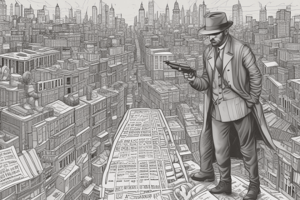Podcast
Questions and Answers
What does criminology primarily attempt to explain?
What does criminology primarily attempt to explain?
- Cultural variations of justice
- Social reforms and their impacts
- Crime and criminality (correct)
- Historical evolution of laws
During which period did the belief in the dignity and worth of the individual significantly develop?
During which period did the belief in the dignity and worth of the individual significantly develop?
- Enlightenment (correct)
- Progressive Era
- Renaissance
- Positivist School
What shift occurred during the Progressive Era in criminology?
What shift occurred during the Progressive Era in criminology?
- Emphasis on cultural determinism (correct)
- Transition to technological analysis
- Focus on genetic determinism
- Return to spiritual explanations
Which theory gained prominence in criminology during the 1950s to 1970s?
Which theory gained prominence in criminology during the 1950s to 1970s?
What concept was emphasized in criminology during the 1980s?
What concept was emphasized in criminology during the 1980s?
What issue does the crisis of criminology refer to?
What issue does the crisis of criminology refer to?
What have been the primary explanations for bad behavior before the scientific approach?
What have been the primary explanations for bad behavior before the scientific approach?
What is a notable aspect of cultural variations in crimes across different societies today?
What is a notable aspect of cultural variations in crimes across different societies today?
Study Notes
Criminology Overview
- Criminology is an interdisciplinary science aimed at explaining crime and criminal behavior.
- The discipline has evolved significantly over time, influenced by various historical and cultural contexts.
Short History of Criminology
- Pre-Scientific Days: Early explanations of bad behavior were rooted in religion and spirituality.
- Renaissance (1450-1600): Focus shifted towards human-centered naturalism, marked by growth in art, philosophy, and primitive science.
- Enlightenment (1650-1800): Advances in mathematics and science, emphasizing individual dignity and rational thought.
- Positivist School (1876): Introduced measuring, sorting, and classifying individuals to understand character and behavior.
- Progressive Era (1890-1920): Transition from biological determinism to cultural determinism; sociology emerged as the predominant field for criminology.
- Integration of Sociology and Psychology (1950’s-1970’s): Highlighted the impact of socialization; prominent theories included control, labeling, conflict, and feminist theories.
- 1980s Shift: A resurgence of focus on free will and rationality, encapsulated by the notion that crime occurs when costs are low.
Criminology in Crisis
- The field currently faces crises, potentially linked to cultural and societal inconsistencies in the definition of crime.
- Examining specific societal examples raises questions about legality and morality, such as age of consent variations.
Cultural Variations in Crime
- Crime definitions and perceptions can differ significantly across cultures, highlighting the need for contextual understanding in criminology.
- Examples from various societal norms, such as Theodor's case and differing age of consent laws, illustrate the complexities of legal understandings.
Questions to Consider
- What constitutes a crime may vary widely, presenting a challenge in establishing universal standards.
- Reflecting on personal beliefs regarding legality can provoke discussions about societal norms and legal repercussions across cultures.
What is Criminology?
- An interdisciplinary field aimed at explaining crime and criminal behavior.
- Examines crime through various lenses, including psychology, sociology, law, and more.
A Short History of Criminology
- Pre-scientific Era: Explanations for deviance were based on religious or spiritual beliefs.
- Renaissance (1450-1600): Shift towards human-centered naturalism with advances in art, philosophy, and early sciences.
- Enlightenment (1650-1800): Emphasis on reason, dignity, and the individual's worth; advancements in mathematics and science shaped new thought.
- Positivist School (1876): Focus on measurement, classification, and character theories emerged in criminology.
- Progressive Era (1890-1920): Move from biological determinism to cultural determinism; sociology became the primary discipline for criminology, leading to structural theories.
- Integration of Disciplines (1950’s-1970’s): Emphasis on socialization influenced theories; highlighted control, labeling, and conflict theories alongside feminism.
- Return to Free Will & Rationality (1980’s): Focus shifted to individual choice in crime, suggesting that crime occurs when costs are perceived as low.
Criminology in Crisis
- Ongoing issues challenge modern criminology's effectiveness and relevance.
- Ethical and legal quandaries evident in case studies, such as the example of Theodor and Abigail, raise questions about age of consent and societal norms.
- Cultural variances in defining crime underscore the complexity and dynamic nature of criminology.
Measuring Crime
- Recognition that definitions of "crime" can differ greatly across cultures and societies.
- Discussion prompted on the variety of acts categorized as crimes in different cultural contexts.
What is Criminology?
- An interdisciplinary science explaining crime and criminal behavior.
- Encompasses various academic fields to analyze the causes and consequences of crime.
A Short History of Criminology
- Pre-scientific Era: Explanations for deviant behavior were primarily religious/spiritual.
- Renaissance (1450-1600): Shift toward human-centered naturalism with advancements in art, philosophy, literature, and early science.
- Enlightenment (1650-1800): Significant progress in mathematics and science, emphasizing individual dignity and worth.
Development of Theoretical Frameworks
- Positivist School (1876): Focused on measuring, sorting, and classifying individuals based on character traits.
- Progressive Era (1890-1920): Shift from biological determinism to cultural determinism; sociology became the foundation of criminology with structural theories of crime.
- Integration of Sociology and Psychology (1950s-1970s): Emphasized socialization; theories included control, labeling, conflict, and feminist perspectives.
- 1980s: A resurgence of ideas around free will and rationality in criminal behavior, proposing that crime occurs when perceived costs are low.
Criminology in Crisis
- Ongoing debates surrounding definitions of crime and the legal responses to various behaviors.
- Cultural differences impact perceptions of legality and morality; examples include varying ages of consent.
Case Examples
- Example of Theodor highlights issues surrounding age of consent and societal norms about relationships.
- Discussion encouraged on cultural variations in defining crime and legality based on local contexts.
Measuring Crime
- Exploration of how crime is quantified and analyzed across different cultural landscapes.
- The definition of crime may vary significantly across societies, influencing legal systems and public perceptions.
Studying That Suits You
Use AI to generate personalized quizzes and flashcards to suit your learning preferences.
Related Documents
Description
This quiz explores the field of criminology, its historical development, and the current crisis affecting the discipline. It highlights key issues and challenges that contribute to this crisis, fostering a better understanding of crime and criminality in society.




